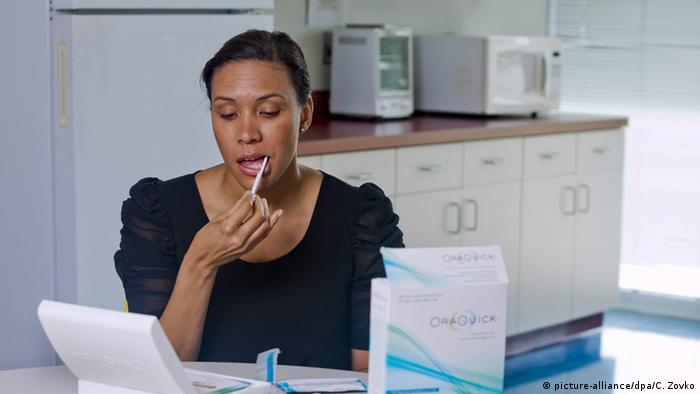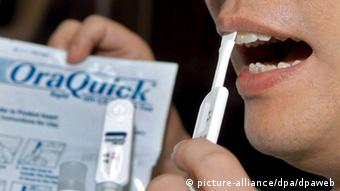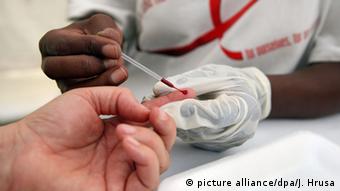Oral kits let people test for HIV at home
A quick swab of the gums and people know their test results. In Malawi, many people didn't get tested for HIV before because that meant visiting a clinic - but they didn't want health officials to know their status.
The test kit looks like a pregnancy test. And like a pregnancy test it's designed to give fast results: A quick oral swab of the upper and lower gums, and 20 minutes later you'll have the results. One line next to the letter C on the stick means the result is negative; if a second line next to the letter T shows up, the result is HIV positive.
The OraQuick test is over 90 percent accurate, according to the company's website. It has been approved by the United States' Food and Drug Administration.
The whole kit usually costs around $60 (54 euros). But in the southeast African state of Malawi researchers from the London School of Hygiene and Tropical Medicine and the Malawi-Liverpool-Wellcome Trust and College of Medicine have been training individuals and are providing OraQuick kits free of charge. To date, over 8,000 such tests have been carried out in Malawi.
"There is a lot hanging on the self testing," said Rodrick Sambakunsi, who works as a counselor with the program. He says the system saves time and is easy to use.
"We are happy with the way it's going. We have the support of the local leaders, the churches and all the communities in the areas where we are working."
Fear prevents many from testing in clinics
Despite many HIV/AIDS awareness campaigns and the government offering HIV testing and counseling in antenatal care clinics, many people in Malawi remain reluctant to go for HIV tests as they fear being stigmatized by others. As a result, HIV-infected women give birth in health facilities without knowing that they are infected.
26-year-old Joshua Mwale learnt about his wife's HIV infection the hard way - after she got tested when she was due for delivery.
"I felt betrayed," he said. "When she was due for delivery, doctors recommended a test. My wife was found to be positive. This forced me to do a test and doctors certified my negative status," he said.
"I felt deceived by my wife, especially when she delivered a premature baby that died five days later. We have since separated and I seek HIV tests every three months."
Two million out of 14 million Malawians are living with HIV/AIDS.
Oral tests carried out at home
Masuzgo Amos is a mother of two. She lives in Blantyre in Malawi's south and has done an oral test herself. She says the OraQuick HIV test is the best weapon in the fight against HIV/AIDS because it's a test that can be done at home.
"As a woman, I need privacy. I have done self-testing many times and nobody knows my status," she said.
"Most people do not want health personnel to know their status. Even [when you have] tests in health facilities, the perception of people is that you are promiscuous. This makes it difficult for one to walk into a health clinic just to be tested."
Specialists, however, warn that it is important that people act on the results. Any positive result provided by the OraQuick mouth swabs has to be confirmed in a health clinic by a finger-prick blood test.



No comments:
Post a Comment